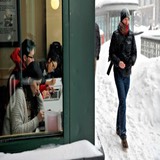
An article from Luana Maroja at Williams College [1],¹ sparks this foray into the way we think and fail to think. I'll try to stay away from issues I have raised before—please read that as me trying not to pound a drum with an old rhythm.
Maroja reports that she wanted to discuss differentials between Brazilians and Americans. One such measure is IQ, where there is a large measured difference between the two nations. I asked students to think about the limitations of the data, which do not control for environmental differences, and explained that the raw numbers say nothing about whether observed differences are indeed “inborn”—that is, genetic. The objective was to discuss heritability, which is the ways that children resemble their parents, behaviour included. So this topic is supposed to provide an insight to the views that general science leads us to from the basis of intelligence data. The students involved in the occasion presented in [1] provided three strands of argument: (i) IQ cannot be measured (ii) IQ tests were always intended to keep minorities excluded and (iii) that IQ cannot be inherited. Yet obviously (i) IQ can be measured—the ways in which the test is constructed and the content of the test can be disputed, but the measurement definitely occurs. Further, (ii) IQ does correlate with academic success, so it does have some predictive value. There is a body of research investigating variation in values of IQ with race and this shows, generally, more about the culture than the variability of humans. For example, some of the tests in English presuppose a good grasp of language precision and so should not be used to evaluate second-language English users. There is (iii) quite a lot of research that shows that IQ is inherited but that it doesn't entirely rest on genes, such that about 50 percent of the variation in measured intelligence among individuals in a population is based on variation in their genes. So all three arguments rejecting IQ can be countered by evidence.
Logic Question
If a baseball and a bat cost $1.10 together, and the bat costs $1.00 more than the ball, how much does the ball cost? ³
But this denialism (is this a new word for the millennium ) is to be found in many discussions of observed differences between groups of humans, including gender-based distinctions. Research I came across last week [3]² suggests that men and women have different optimum desk-based working temperatures and that, given the male bias, this means in turn that women are disadvantaged in the office space, since their brains are shown to work a bit better at a slightly higher temperature. Given also that men tend to wear more and women less when in an office environment and this merely exaggerates that temperature difference. Cooler offices make the men work better and the women work less well.
To my surprise, some students even objected to other well-established biological concepts, such as “kin selection,” the idea that, when individuals take actions for the benefit of their offspring and siblings, they are indirectly perpetuating their own genes. Startled students, falling into what we call the “naturalistic fallacy”—the notion that what occurs in nature is good—thought I was actually endorsing Trump’s hiring of his family! Things have gone so far that, in my classes, I now feel compelled to issue a caveat: Just because a trait has evolved by natural selection does not mean that it is also morally desirable. [1]
Denial is furtive and routine; denialism is combative and extraordinary. Denial hides from the truth, denialism builds a new and better truth. [4]
What on earth causes us to behave like this? Is this more of that (old drum beat) simple avoidance of thinking? Is this class of self-deception in any way healthy? I agree that we see this in academia, where a growing body of research shows a thing such as climate change to be evident, so that we see counter-argument equivalent to the pantomime 'Oh no it isn't'. We see this in many issues where there is commercial advantage to be had and commercial interest to be furthered. Yes, diesel cars produce toxins, but new diesels meet the new regulations so 'diesel is bad' is not quite true. Burning any fossil fuel is apparently bad, ergo using any fossil fuel is bad —but without viable alternatives we will continue as we are. Hence the argument over personal vehicles; we require to either not need to travel or for public transport to function far better than it does. I have long said that each of these arguments reduces to a matter of education, that we can change society by consensus by agreeing what it is that is true (stands up to criticism) and what it is that as a society we agree that we want (too often, simply more for less).
Denialism is evident in those called anti-vaxxers. ⁴ I do not argue that we should be painfully honest at all times; I recognise that a significant part of what makes a society requires us to keep some thoughts to ourselves and to cal this civility, that some things should not be said. I continue to take issue with what the press call leaks, too much of which is catching that which should not be said in public being said in private and then made public. No, we do not "need to know", though one service the press can serve is to say such things without attribution, so that the service is to make us aware of a truth or opinion so we might judge for ourselves whether we are guilty of (more) self-deception.⁵ I have always disapproved of self-deception and conversely approved self-honesty. The extent to which you are prepared to say things that are not true is a set of choices you make; I am very reluctant to knowingly do so—I'd far rather say nothing or ask a question as a response ("Why do you think that?"). So I wonder whether the small-scale quotidian denial leads to denialism in the sense of refusal to accept and that, when this leads to matters that affect the rest of the population, this is a really Bad Thing. At which point your mind leaps to a list of things for which others would say you are exhibiting denialism, perhaps some aspect of Brexit or climate change.
Quoting [4] Climate change denialists have not managed to overturn the general scientific consensus that it is occurring and caused by human activity. What they have managed to do is provide subtle and not-so-subtle support for those opposed to taking radical action to address this urgent problem. Achieving a global agreement that could underpin a transition to a post-carbon economy, and that would be capable of slowing the temperature increase, was always going to be an enormous challenge. Climate change denialism has helped to make the challenge even harder.
What is insidious is that a challenge of denialism is treated as provocation, hence rage and as such it is treated as a personal affront. Examples {4] again, creation science in the US, or holocaust denial in France ⁶. Personally I'd rather try to identify and undo the denial by questioning, leading me to the occasional conclusion that the denier is an idiot (someone who refuses to think) and therefore unfriended. This is particularly difficult with family, where one can do little but lengthen the list of non-topics.
A wholly more constructive approach is to ask how we might adjust our society to cause denialism to disappear. I recognise that a large amount of what I consider humour starts from a premise and explores the point at which this becomes ridiculous. reductio ad absurdam⁷ There is a distinct difference between testing a postulate <suggestions at ⁸>, and selectively seeking to defend an existing view by rejecting a mass of contradictory evidence. Yes, I too will go grab hold of confirmation of an existing view but if all such support is simply an echo-chamber construct unsupported by evidence then it must be recognised as such, a castle in the air.
A part of what has gone wrong is that the rigorous thinking we expect from academia has somehow been politicised. In allowing this to occur, science in general can be refuted as being biased, often due to the funding source having bias. So the impartiality is lost, everything is regarded as suspect and in turn nothing is left being agreed as true. This is an awful state to be in. Among the consequences is a loss of trust; I say that trust is an essential element of a society, certainly of one I might be persuaded to participate in. A serious lack of trust and trustworthiness rapidly leads to a breakdown of society. Academic rigour, in a state where perception of that absence is quite sufficient to render all results acceptably refutable, needs to be defended and confirmed; it needs to be applicable to the social sciences and we need the tools to demonstrate that results from these fields are not only defensible but applicable. I'd like this to apply to interpersonal relationships at a local and general level quite as much as i'd like to to apply to economics.
DJS 20190523
top pic is a fabrication; ostriches don't do this. See.
[1] https://www.theatlantic.com/ideas/archive/2019/05/self-censorship-campus-bad-science/589969/?utm_source=newsletter&utm_medium=email&utm_campaign=atlantic-daily-newsletter&utm_content=20190528&silverid-ref=NTE3MDgxNDgxMDUyS0
[3] https://www.theguardian.com/world/2019/may/23/womens-brains-work-better-in-warmer-offices-study-finds https://www.theatlantic.com/health/archive/2019/05/warm-offices-women-productivity/589966/ ²
[4] https://www.theguardian.com/news/2018/aug/03/denialism-what-drives-people-to-reject-the-truth
[5] not read at all. https://www.amazon.com/Denialism-Irrational-Thinking-Scientific-Progress/dp/1594202303 Michael Specter, Denialism. From Publishers Weekly: Although denialists, according to Specter, come from both ends of the political spectrum, they have one important trait in common: their willingness to replace the rigorous and open-minded skepticism of science with the inflexible certainty of ideological commitment. Specter analyzes the consequences of this inflexibility and draws some startling and uncomfortable conclusions for the health of both individuals and society. For example, though every reputable scientific study demonstrates the safety of major childhood vaccines, opponents of childhood immunization are winning the publicity war; childhood immunizations are tumbling and preventable diseases are increasing, often leading to unnecessary deaths. Specter, a New Yorker science and public health writer, does an equally credible job of demolishing the health claims made by those promoting organic produce and all forms of alternative medicine. Specter is both provocative and thoughtful in his defense of science and rationality—though he certainly does not believe that scientists are infallible. His writing is engaging and his sources are credible, making this a significant addition to public discourse on the importance of discriminating between credible science and snake oil. (Nov. 2)
Copyright © Reed Business Information, a division of Reed Elsevier Inc. All rights reserved.
[6] https://www.russellsage.org/publications/trust-society-0
1 Williams College, Williamstown, Massachusetts USA wikipedia link. It rates highly as a liberal arts college with a small undergraduate body of around 2000. Just because I've not heard of it doesn't mean it isn't good (which has always been true). Other small colleges would include Amherst, Pomona, Swarthmore, Vassar, Wellesley. See list
2 From The Atlantic's report For the study, published today in the journal PLOS One, the researchers Tom Chang and Agne Kajackaite had 543 college students in Berlin take different types of tests in a room set to various temperatures between 61 and 91 degrees Fahrenheit. First, the participants had to answer logic problems, like the one about a bat costing $1 more than a ball. Then, the students were asked to add up two-digit numbers without a calculator. Finally, they had to form German words out of the letter scramble ADEHINRSTU.
When the room was warmer, women answered more questions on the math and verbal tests, and got more questions right. A 1-degree Celsius increase in the room’s temperature was associated with a nearly 2 percent increase in the number of math questions the women correctly answered, and a 1 percent increase in their performance on the verbal task. The men, meanwhile, did better at cooler temperatures, but their decrease in performance at warmer temperatures was not as great as women’s gains. (For the logic problems, the temperature didn’t seem to make a difference.)
3 I really hope you didn't respond that the ball was 10 cents, 'cos then the bat would be $1.10 and they'd cost $1.20 together, not $1.10. Perhaps your room temperature needs to change? The ten-cent answer is deemed intuitive . More research correlates these intuitive (or not) answers with your acceptance (or denial) of religion — the ten cent answer is more likely to come from a believer. I find that disturbing.
Some people think this is a similar logic problem: In a lake, there is a patch of lily pads. Every day, the patch doubles in size. If it takes 48 days for the patch to cover the entire lake, how long would it take for the patch to cover half of the lake? I don't see it the same way, but having had to stop myself from leaping at a ten-cent answer, went and doubled-checked my answer. Double-checking in maths is what you do when you find a different route to the solution. The first check is to take your answer and put it back into the question — which tells you you have AN answer, not necessarily all answers. The second check is to find a second approach to a solution, perhaps by solving a more general problem. General case for lily pads is to see that this is an exponential problem, so the last increase is very close to the end. Which is the issue with climate change, for example. I see this more of a problem with a constant use of linear models and hence a reluctance to look at other models. A parallel in lower-level maths is when playing with series, assumed arithmetic, then geometric— and then meeting a Fibonacci series. Or a series based on something completely different; an example I met recently was: 3, 3, 5, 4, 4, 3, 5, 5, 4,..... Add more than one to this series. Bottom of page.
4 Anti-vaxxer; person who refuses to take vaccines. E.g. measles, where the general population has an immunity only if a sufficiently high proportion of that population has been vaccinated. Measles is a childhood disease that has a significant risk of long-term health issues when contracted in later life and a lower risk of such issues when caught in childhood. Read this which will lead you to other sources. We require a 93-95% uptake for what is called herd protection level, or herd immunity. For polio, 80-85% will suffice. However, herd immunity can be compromised locally (e.g. an age group is missed out, a religious group excludes itself). Also the target of say 95% means that attempts must be aimed significantly higher, like at 100% and then allow for accidental failure rather than allow for deliberate exclusion. Thus it can be argued that children whose families refuse to be vaccinated might justifiably be refused state schooling on the grounds that they put everyone else at appreciable risk. Worth further investigation. Maths papers on serology too, perhaps. See also footnote 8, third postulate, below.
5 Many will disagree with me here, so I'll try to explain my thinking further. There are matters which are private and communications can be private, such as between you and me. That communication then belongs to the two of us and I would not share your opinion and attribute it to you as i do that without some ta it understanding that you would not mind. For example, if you expressed a strong opinion, then I might well pass on a version of what you think, because the strength of your expressed opinion indicates definiteness. Someone deliberately eavesdropping (not the same as unavoidably hearing), especially any form of bugging a private conversation is, in passing on such private communication, breaching trust that what was private was indeed private, breaches all sorts of social conventions and is quite possibly criminal behaviour. Someone else receiving this information obtained by deliberate deceit is then supporting that misbehaviour, condoning it—and is guilty of the same offence by association. I see this as Wrong. I do not in any sense support obtaining such information. The situation is different if the private conversation is not private, such as between two MPs with adjacent staff (staffers, if you prefer US English). If the staff then leak content of that conversation, this is a breach of their employment conditions. I could understand that, if a reporter-type came across leaked information, they would use this as leverage to cause a statement to be made publicly (to a reporter).
Where a document is leaked, there are similar issues: is this information yours to share? If it isn't by what right do you choose to act as a source of leakage? To me, this is straightforward, in that the test is to do with legality. If the document is in breach of a law, or points to a breach occurring, then leaking seems appropriate. I can see that there night well be issues which make this non-binary (grey, not black/white) and I'll happily listen to examples. I suppose that comes down to you finding yourself in the position of an unwilling participant in something you feel is Wrong. I can see that for civil servants, who have taken some sort of vow to not breach all sorts of rules keeping information within the service, this should not occur (but that it will occur with greater likelihood as soon as there are sub-contractors). I can see that politicians in particular exist by trading short-term and short-lived pieces of information, which makes them unreliable as keepers of anything even a little bit secret.
I also think that there is little place for gossip and rumour, but that is my choice. My position centres on 'who owns this opinion?'. I feel quite differently with information (something approaching fact), that which can be checked. If someone is hiding such information then i find myself often agreeing with those who think all should be transparent. That said, though, I feel differently about analysis and conclusion, where there is work done that needs to be paid for; that is because I've been in the position of the generator of such analysis and I needed to be paid for that effort—indeed, my pay depended upon being paid for such.
6 Denial of Holocaust is an offence in France. Creation science is taught in some US states, sometimes in parallel with evolution.
7 reductio ad absurdam is a class of mathematical proof. link too slow for me, and not well explained; link another irritating voice link pretty good, even if an American version of humour.
8 Postulate 1: heavy things fall faster. Suppose they do. Imagine two rocks of different sizes, say head size and fist size. The bigger one falls faster; so tie them together and the small one will act as a brake on the other. But the two together are heavier still, so they will both fall faster and fall slower. Therefore the postulate is wrong, by reductio ad absurdam.
Postulate 2: we will be worse off if Brexit occurs. I offer only the postulate. There is only opinion, since (i) no country has left the EU before (ii) many people see bad things on the horizon, but that alone is insufficient (look at any new transport; trains, cars, planes etc). We could ask ourselves to list benefits from not being within the EU—not what we lose, but what we gain. I find very few advantages and each one of those depends on Britain managing to be in some sense more sensible, 'better,' than Europe. I have low confidence in our institutions in managing change.
Postulate 3: I am better off without a vaccine. That is saying that the risks attached to catching the disease are smaller than the risks attached to having the vaccination. You might replace 'risks' with 'perceived costs', so as to include being bothered to go have a vaccine. You might modify the postulate to reflect the position of wider society. Issues of herd immunity do allow that a small percentage of the population be not vaccinated and still safe, but that is expected to be soaked up by movement of people. So one issue here is selfish, that by not being vaccinated one is putting the population at large at some risk; therefore one might expect that the same larger population demand some return for in some sense allowing you to be not vaccinated. Such as being denied school, or increased taxation to cover the attached costs or other cost or denied benefit. There is a possible distinction in risk to me, risk to you and risk to the general population. What often obscures such matters (decisions, perhaps) is that the relative risks are easily confused. Quantity over quality. One way to consider this topic differently is to replace 'vaccine' with something different and innocuous, like 'diet'.
Suppose the premise is "I am better off eating no meat". We can find evidence that says that we are individually better off eating less meat but not none. We can demonstrate that everyone eating less meat would release land that could instead be used for crops and actually more food, less water consumption and general benefit. Some land used for growing meat is considered not suitable for crops, so we don't want 'no meat'. Moving to zero meat raises issues that mark the lines between vegetarian and vegan — and I have trouble finding believable evidence that provides a decision. Less meat seems to be Good. I find the same with target body mass, particularly once BMI moves to levels labelled obese. You can argue that not eating meat is a personal choice that does not affect the populace; that not being vaccinated does affect the populace; that being obese does too (in the knock-on effects generally labelled as health care). So the idea of replacement (diet for vaccine) helpfully reveals properties of the original problem. As has been discussed in previous essays, when a personal decision you make affects no-one but you, you have every right to expect to be able to make such a decision freely. When an equivalent decision affects others, then society does have some inputs. The residual argument is as much about whether you accept that there is an effect as it is about what society as a whole can reasonably exact upon you. Examples apply locally to things like noise, changes of use and changes to built environment. Examples apply in a wider sense to things like national interest, societal interest, global interest. Discuss.
DJS 20190530
9
DJS 20191120
MORE STORIES

As the Climate Gets Hotter, Will Everyone Work Less?

The Enduring Appeal of Being Hot

Bad Weather: Better for Work, Terrible for Everything Else

Western Fashion Is Turning the World's Offices Into Freezers
3, 3, 5, 4, 4, 3, 5, 5, 4,.... next few are 3, 6, 6, 8, 8, 7, 7, 9.... I agree it appears that answers ought to recognise (3,3 5, 4,4 3, 5,5 4, so the next two ought to be 6,6. But it is not obvious what the 5 ,, 3,, 4,, ought to provide as 'next'.
One, two, three, ..... ten, eleven, twelve and so on.